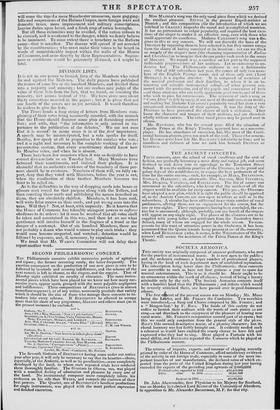SECOND PHILHARMONIC CONCERT.
THE Philharmonic concerts exhibit successive periods of agitation and repose ; the former occurring rarely, the latter frequently. The exertion consequent on the production of one new piece is sure to be followed by lassitude and seeming indifference, and the scheme of the next concert is left to chance, to the singers, and the copyist. That of Monday night exhibited no novelty of character. The same instru- mental pieces which have been played for we know not how many suc- cessive years, appear again, grouped with the most palpable negligence and indifference. Three compositions of BEETHOVEN (two in almost immediate sequence), or of any writer, necessarily preclude that variety which it should be the aim of those who manage these concerts to in- troduce into every scheme. If BEETHOVEN be allowed to occupy more than his share of any programme, MOZART and others must (as in the present instance) be excluded.
ACT I.
Air, Mr. E. SEOUtN,'• Now heaven in fullest glory shone" (Crentioa) Introduction and Air varie, Bassoon, Mr. IlAumAnn
Terzetto, Madame CARADORI ALLAN, Miss MASSON, and Mr. E. SEGUIN," Corraggio or su "(Fidclio) BERTIIOTEX. Overture, II/runs-1nd Circe B. BOMBER°. Leader, Mr. Moor—Conductor, Mr. POTTER.
The Seventh Sinfonia of BEETHOVEN having come under our notice year after year, it will only be necessary to say that its beauties—those, especially, of the Andante, as well as its peculiarities—were completely developed by the band, to whom such repeated trials have rendered them thoroughly familiar. The Overture to Oberon, too, was played with a manifest feeling of admiration and pleasure by every one of the band. No instrumental composer more completely lutists his orchestra on his side than WEBER, and compels the exertion of their best powers. The Quartet, one of BEETHOVEN'S loveliest productions for single instruments, was played with the most perfect expression and finished execution.
Sinfonia, No.7
Aria. (MS.) Miss MASsON, "Non VI; pill !ma'am." Quartetto.(in A)Two Violins. Viola.Violoncello.Messrs. MORT• TOLBECQUE, MORALT. and LINDLEY Aria, Mad. CARADORI ALLAN, " Casta Diva" (Norma) Overture, Ober.n
ACT II.
Sinfonia, No. 5
BEETHOVEN. STUNTS.
BEZT1FOCEN.
BELI.INt.
C. M. vox WEBER.
iI ATT.N.
MAYON. BAUMANN.
Miss Massoses song was the only vocal piece from which we derived
the smallest pleasure. STUNTZ :is the present Kapell-meister at Munich ; and this composition (for the introduction of which we are indebted to CRAMER) bespeaks the sound and accomplished musician. It has no pretensions to vulgar popularity, and required the best exer- tions of the singer to render it an effective song, even with those who could appreciate its excellence. Madame CARADORI'S song was a dis- grace to this or any concert. We will not discredit the taste of the Directors by supposing them to have selected it, but they cannot escape from the shame of having connived nt its insertion : nor can we think so meanly of the singer's taste (the charming representative of Zerlina and Cherubino) as to imagine that she can prefer such trash to the songs of Mozaar. We regard it as a sacrifice on her Fitt to the supposed fashionable prepossessions of her auditors. Let us endeavour to un- deceive her. The Philharmonic audience is not a fashionalde one. Out of 630 subscribers last year, the names of only two mem- bers of the English Peerage occur, and of these only one ( Lord HoTuan) is a regular ;mender. It is composed of members of the musical profession and their families, to whom it is an in- teresting and valuable instrumental school—of other persons con- nected with the profession, and of the pupils and connexions of both —of those amateurs who can really appreciate genii music, and of those who wish to pass for connoisseurs. The selection of such a song as " Costa Diva" is felt by many, if not most of the audience, as an insult; and nothing but Madame CARADORI'S populatity saved her from a very unequivocal manifestation of their opinion. It was the duty of the Directors to have prevented the chalice of such a visitotion. They know the character and temper of their auditors, and are therefore wholly without excuse. The other vocal pieces may be passed over in silence.
Mr. BAUMANN, who has for several years filled the situation of
Fagotto Primo at the King's Theatre, appeared here as a concerto- player. He has abundance of execution, but, like most of the Conti-
nental bassoon-players, gives too much of the reed. Those whoremem- ber IlotatEs must have felt Mr. liat.maNs's inferiority to him ; and in roundness and richness of tone we rank him beneath DENMAN or
GODFREY.


























 Previous page
Previous page